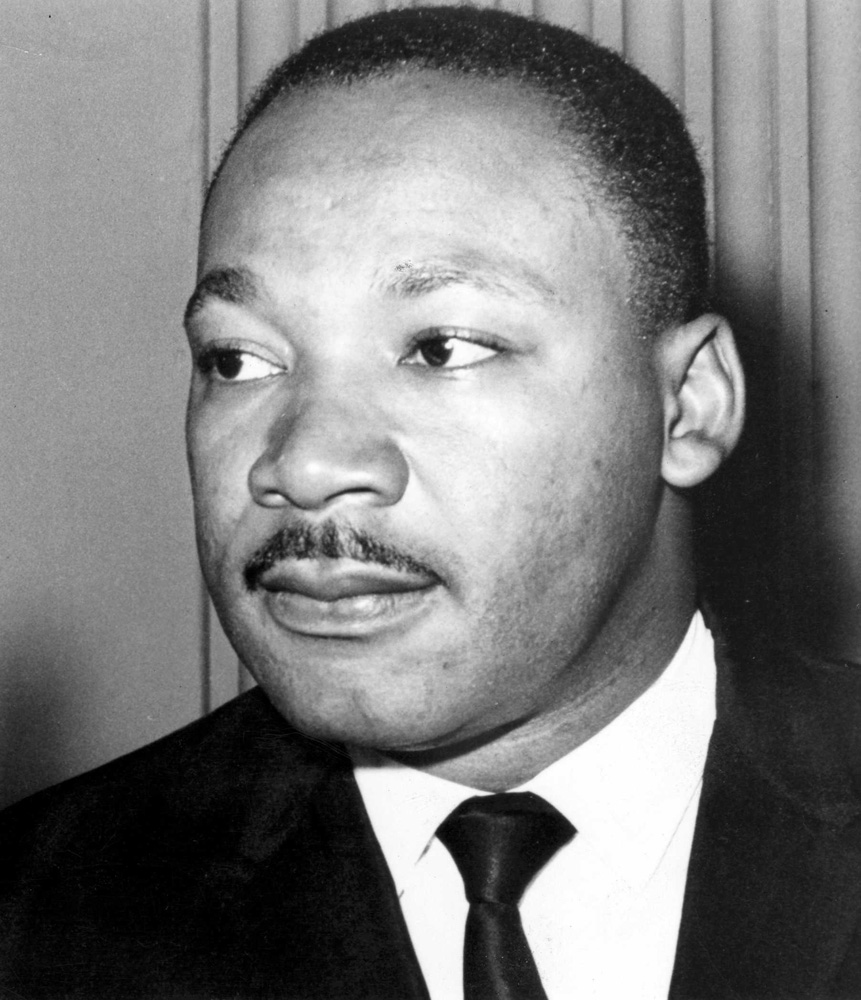Martin Luther King- Seconde- Anglais
- Fiche de cours
- Quiz et exercices
- Vidéos et podcasts

|
| Doc. Martin Luther King |
King studied theology and received his Doctorate degree in 1953. Nearly a year after, he moved to Montgomery (Alabama) to preach at Dexter Avenue Baptist Church, with his newly-wed wife, Coretta Scott.
After one year of boycotting the bus system, the Supreme Court declared that the Alabama state segregation law was unconstitutional. That was a great legal victory but it took many years before things really changed.
In 1957, for instance, President Eisenhower had to call 1,000 soldiers to escort 9 Black students and restore order in the previously all-White Central High in Little Rock (Arkansas). In 1962, two people were killed and many more injured as James Meredith was enrolled as the first Black at the University of Mississippi!
After a year of travelling and demonstrating across the country, King continued to organise non-violent protests against unequal treatment. Contrary to Malcolm X who encouraged people to be violent, King advocated peace.
In 1958, King published his first book, Stride Toward Freedom, which deals with his recollections of the Montgomery bus boycott.
In 1968, Martin Luther King Jr was assassinated by James Earl Ray. His death did not slow down the Civil Rights Movement. His widow, Coretta, continued to fight for freedom with Black and White people.
In 1986, President Ronald Reagan declared the third Monday in January a federal legal holiday commemorating Martin Luther King's birthday. King is the only Afro-American to have a legal holiday in America.

Des quiz et exercices pour mieux assimiler sa leçon
La plateforme de soutien scolaire en ligne myMaxicours propose des quiz et exercices en accompagnement de chaque fiche de cours. Les exercices permettent de vérifier si la leçon est bien comprise ou s’il reste encore des notions à revoir.

Des exercices variés pour ne pas s’ennuyer
Les exercices se déclinent sous toutes leurs formes sur myMaxicours ! Selon la matière et la classe étudiées, retrouvez des dictées, des mots à relier ou encore des phrases à compléter, mais aussi des textes à trous et bien d’autres formats !
Dans les classes de primaire, l’accent est mis sur des exercices illustrés très ludiques pour motiver les plus jeunes.

Des quiz pour une évaluation en direct
Les quiz et exercices permettent d’avoir un retour immédiat sur la bonne compréhension du cours. Une fois toutes les réponses communiquées, le résultat s’affiche à l’écran et permet à l’élève de se situer immédiatement.
myMaxicours offre des solutions efficaces de révision grâce aux fiches de cours et aux exercices associés. L’élève se rassure pour le prochain examen en testant ses connaissances au préalable.

Des vidéos et des podcasts pour apprendre différemment
Certains élèves ont une mémoire visuelle quand d’autres ont plutôt une mémoire auditive. myMaxicours s’adapte à tous les enfants et adolescents pour leur proposer un apprentissage serein et efficace.
Découvrez de nombreuses vidéos et podcasts en complément des fiches de cours et des exercices pour une année scolaire au top !

Des podcasts pour les révisions
La plateforme de soutien scolaire en ligne myMaxicours propose des podcasts de révision pour toutes les classes à examen : troisième, première et terminale.
Les ados peuvent écouter les différents cours afin de mieux les mémoriser en préparation de leurs examens. Des fiches de cours de différentes matières sont disponibles en podcasts ainsi qu’une préparation au grand oral avec de nombreux conseils pratiques.

Des vidéos de cours pour comprendre en image
Des vidéos de cours illustrent les notions principales à retenir et complètent les fiches de cours. De quoi réviser sa prochaine évaluation ou son prochain examen en toute confiance !









